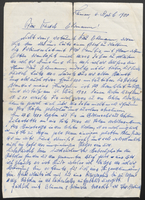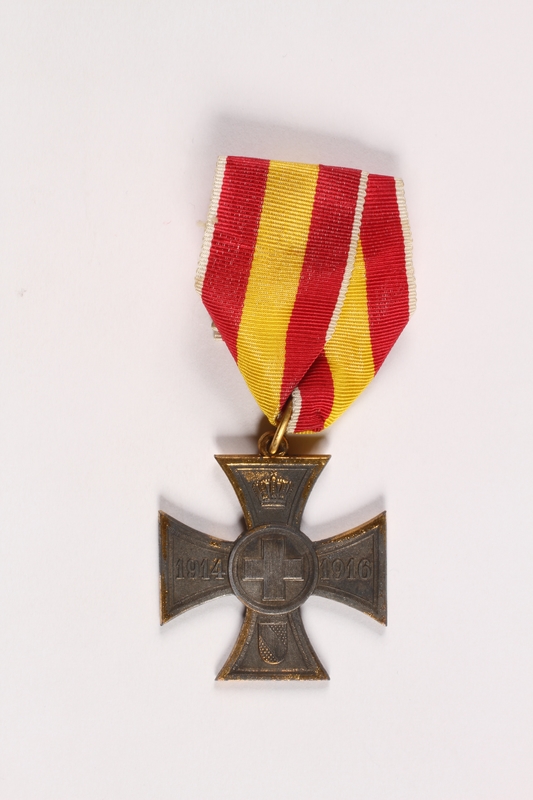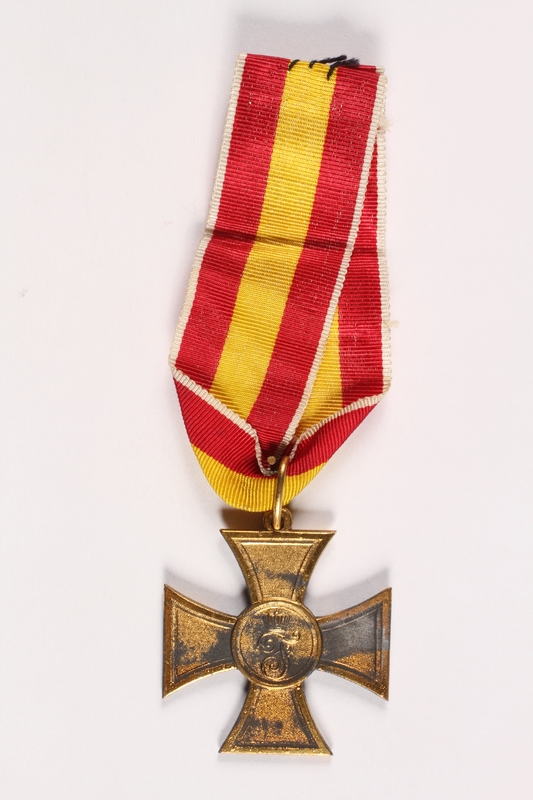Overview
- Brief Narrative
- Kreuz für freiwillige Kriegshilfe [Volunteer War Aid Cross] 1914-1916, belonging to Oskar Ehrmann. The Cross was awarded to men and women who provided outstanding service in caring for the sick and wounded, outside the war zone, or for other voluntary service in support of the war. Ehrmann was awarded a Cross of Honor for service on the front line during the First World War (1914-1918), issued in 1934. Oskar's two brothers were also German Army officers in WWI. In 1933, the Nazi regime came to power in Germany and enacted policies to persecute the Jewish population. Oskar decided to leave Germany with his family. In June 1937, Oskar, his wife Friedel, their children, Hans, 14, and Rolf, 12, and Friedel's brother Gustav sailed to America. They were later joined that by several family members, but many were unable to leave and perished.
- Date
-
commemoration:
1914-1916
- Geography
-
issue:
Germany
- Credit Line
- United States Holocaust Memorial Museum Collection, Gift of Linda Ziskind
- Contributor
-
Subject:
Oskar Ehrmann
- Biography
-
Oskar Salomon Ehrmann was born on July 4, 1893, in Nussloch, Germany, to Jewish parents, Helene Richheimer (1856-1942, US) and August Ehrmann (1853-1898). He had two brothers, Wilhelm (1891-1950, Israel), and Ferdinand (1895-1953, US) and two sisters, Nani (1889-1906) and Mina (1882-1964, US). During World War I (1914-1918), Oskar and his brothers served as an officer in the German Army. Oskar was awarded a Cross of Honor for his service on the front line. After the war, he became a merchant. Oskar married Regina Menges, born 1896, and they had two sons, Hans, (1923-1985), and Rolf, (1925-1966). Regina died in October 1935. Oskar married Friedericke (Friedel) Mayer, who was also Jewish, on August 7, 1936. Friedel was born on July 9, 1909 in Leimen, Germany, to Hugo, born 1864, and Karoline, born 1879, Bierig Mayer. Friedel had two younger brothers, Gustav (1910-1969), and Kurt (1921-2007).
The Jewish population was increasingly persecuted by the Nazi dictatorship which took power in Germany in 1933. Jews were barred from jobs and their property and businesses were confiscated or subject to forced sales. Oskar decided to leave Germany with his family. In March 1937, as part of his preparations for emigration, Oskar applied for a leave of absence from the local military command in Heidelberg, which was granted through the end of his compulsory military service. In summer 1937, Oskar, Friedel, and the boys, 14 year old Hans and 12 year old Rolf, and Friedel's brother Gustav, sailed to America on the Bremen, arriving on June 1. The family settled in Toms River, NJ. He Americanized his name to Oscar. His brother Ferdinand, his wife Anna, and children Ruth, 8, and Norbert, 7, arrived in the US in November 1937. Oskar's mother Helene and sister Mina arrived on June 30, 1938. Friedel's brother Kurt fled to Great Britain in July 1939. Oscar and Friedel made efforts to get many other family members to America. On September 1, 1939, Germany invaded Poland. In spring 1940, Friedel’s brother Kurt was interned for five months as an enemy alien on the Isle of Man. Friedel and Oscar had a son on March 3, 1940. Oskar, 47, passed away on June 9, 1940.
The war in Europe ended with Germany's surrender on May 7, 1945. Friedel's parents and other family members who remained in Germany did not survive. In October 1940, her parents Hugo and Karoline were deported to Gurs internment camp in France. In February 1941, they were sent to Noe detention camp where Hugo died of illness on January 1, 1942. Her mother Karoline was transferred to le Vernet detention camp in 1943 and deported to Auschwitz concentration camp in 1944 where she was killed. Friedel's brother Kurt immigrated from England to the US in 1957. Friedel, 94, passed away in October 2003, in Tom's River, NJ.
Physical Details
- Language
- German
- Classification
-
Military Insignia
- Category
-
Medals
- Object Type
-
Medals, German (lcsh)
- Physical Description
- Shiny, gold gilt painted, zinc (est.) cross pattee medal, 1.5 x 1.5 inches, with fluted edges and arms lightly grained on the front and back. On the front is a central medallion embossed with an equilateral, vertically ridged, Geneva cross. Embossed on the upper arm is the crown of Baden; on the lower, a shield with the arms of Baden, on the left, 1914, and on the right, 1916. On the reverse, the center medallion has an ornate, crowned F, the monogram of Grand Duke Friedrich. At the top is a bail with a suspension ring threaded with a grosgrain ribbon with 5 vertical stripes: narrow white, red, center yellow, red, narrow white. The ribbon ends are stitched together with black thread. The gilt is worn and darkened from oxidation.
- Dimensions
- overall: Height: 4.875 inches (12.383 cm) | Width: 1.500 inches (3.81 cm) | Depth: 0.125 inches (0.318 cm)
- Materials
- overall : metal, paint, ribbon
Rights & Restrictions
- Conditions on Access
- No restrictions on access
- Conditions on Use
- No restrictions on use
Keywords & Subjects
Administrative Notes
- Legal Status
- Permanent Collection
- Provenance
- The medal was donated to the United States Holocaust Memorial Museum in 2014 by Linda Ziskind, granddaughter of Oskar Ehrmann.
- Funding Note
- The cataloging of this artifact has been supported by a grant from the Conference on Jewish Material Claims Against Germany.
- Record last modified:
- 2023-08-31 15:27:29
- This page:
- https://collections.ushmm.org/search/catalog/irn524514
Download & Licensing
In-Person Research
- By Appointment
- Request 21 Days in Advance of Visit
- Plan a Research Visit
- Request to See This Object
Contact Us
Also in Mayer, Bierig, and Ehrmann families collection
The collection consists of a medal, correspondence, and documents relating to the Mayer, Bierig, and Ehrmann families before, during, and after the Holocaust in Germany, and the United States where several family members emigrated to escape persecution.
Date: 1928-2012

Mayer, Bierig, and Ehrmann families papers
Document
The Mayer, Bierig, and Ehrmann families papers consist of biographical materials and correspondence documenting the family’s lives in Nazi Germany, emigration to England, deportation to France, and immigration to the United States. Biographical materials include identification papers; birth, registration, marriage, and death certificates; education, training, and employment records; emigration and immigration records; ration books; and a family tree documenting the lives of the Bierig, Ehrmann, and Mayer families in Germany and their departures for England and the United States. They also include printed materials documenting the cultural activities of youth in British enemy alien internment camps. Correspondence includes letters and postcards among family members and friends in Leimen, Nussloch, Gurs, Noé, Manchester, the Isle of Man, Toms River, and Brooklyn. The correspondence describes daily life in Germany, the United States, and England; deportation to France and life in French concentration camps; and efforts to emigrate. Letters also share family recipes as well as news of the deaths of family members and friends. This series also includes postwar correspondence from Kätchen Brandner, who had worked for the Mayer family in Leimen, and Paula Gluck, who was in Noé with the Mayers, providing news about the fates of family members and friends and about postwar life in Germany.





